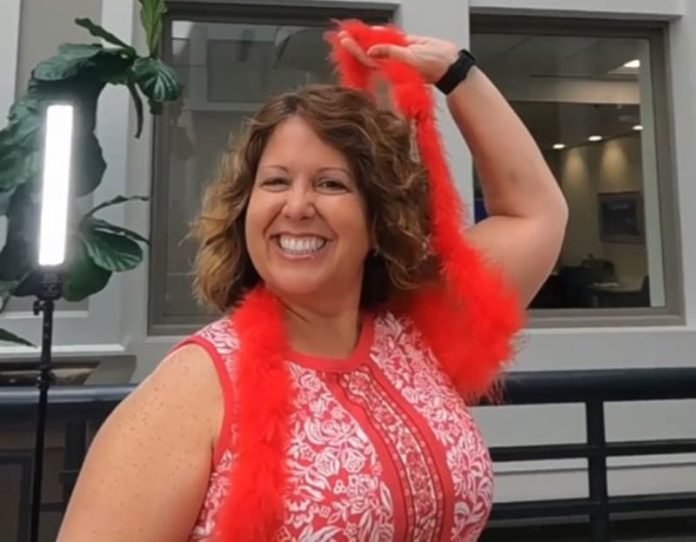
Danielle McCollian needed some work done at her house. While at the post office, she saw an ad on the bulletin board for a guy who did remodeling.
She called, he came out and that was that. They married when she was 39 and Joe was 32. A year later, they decided to start a family. After several miscarriages, she used in vitro fertilization to become pregnant with twins.
She was hospitalized at 30 weeks because of preeclampsia, a type of high blood pressure that occurs during pregnancy; otherwise, the pregnancy and delivery went smoothly, and babies Gianna and Joey were healthy.
When Danielle developed shoulder pain within the next few weeks, she chalked it up to carrying around two infants.
One evening, she and Joe left the babies with Joe’s aunt and went to a Philadelphia Phillies baseball game.
When she returned home, the pain in her shoulder was really bothering her, so Joe called her obstetrician. While he was on the phone, Danielle collapsed. Her heart had stopped beating.
Joe called 911. Knowing CPR, he began giving chest compressions. At the hospital, Danielle was put into a medically induced coma. Doctors put a stent in one artery that was blocked in two places and another in an artery that was 100% blocked.
She was diagnosed with spontaneous coronary artery dissection, a rare cause of heart attack that occurs when blood flow is blocked because of a separation, or tear, in the lining of the coronary artery wall.
In the hospital, Danielle was afraid to go to sleep, fearing that she wouldn’t wake up. Her obstetrician and cardiologist told her what happened was likely related to her pregnancy.
They also reassured her that the further she got from delivery without any repercussions, the more likely she’d be fine.
Her heart function indeed returned to the level of someone who never had a heart attack, and life went on. She and Joe loved spending time together and watching the twins get older.
When Joey and Gianna were about 4, Joe began having health problems. His legs and ankles swelled. He could barely tie his shoes. At 6-foot-3 and 250 pounds, he had extreme fatigue, sleep problems and heartburn.
Heart disease was no stranger to Joe’s family. His father had a massive and debilitating stroke at age 58 and died 12 years later.
His mother had been diagnosed with atrial fibrillation, a type of irregular heartbeat. Yet for Joe, bloodwork showed no abnormal heart function, Danielle said. Kidney issues seemed more likely.
On Jan. 29, 2019, Joe was home and not feeling especially well. Danielle went to work that day, and afterward picked up the twins from kindergarten. When she returned, the house was dark; she sensed something was wrong.
She told the kids to wait downstairs. Then she found Joe. She started CPR, but he was gone, having died of sudden cardiac arrest. He had undiagnosed cardiomyopathy.
“My own heart situation was horrible in the moment,” she said, “but because I had such a good prognosis and healed quickly, I was able to move on from that. Then your husband dies suddenly.”
She paused. “It’s been a long journey.”
Danielle makes sure to tell the twins stories of how she and their dad met, to show them photographs, to share what kind of man he was. She makes sure the family gets plenty of exercise – Gianna takes four different dance classes; Joey plays football and baseball – and eats heart-healthy foods.
“For a long time, it was just a fact of life we dealt with: Daddy isn’t here,” she said. “But now that they’re older, we’ve talked a number of times about how we have to make sure their hearts are healthy, which Daddy’s wasn’t.”
The family’s history of heart disease led Joe’s sister, Amy Novak, to become involved with the American Heart Association. She’s part of her local Go Red for Women executive leadership team.
“Everyone knows someone whose life has been affected by heart disease,” Novak said. “Our family background is so entwined with losses and survivors due to heart disease, it’s become easier to tell a personal story to encourage people to help.”
The twins are helping get awareness out, too. When they were in second grade, they brought home a brochure about the Kids Heart Challenge, an AHA fundraiser focused on teaching kids to keep their hearts healthy.
“I told them, ‘Oh, we should do this in memory of Dad and raise money so other people don’t have to live without their dad like we do,'” Danielle said. “He was a big-hearted person, a big guy with a big heart.”
Written by Leslie Barker.
If you care about heart disease, please read studies that herbal supplements could harm your heart rhythm, and how eating eggs can help reduce heart disease risk.
For more information about heart health, please see recent studies that apple juice could benefit your heart health, and results showing yogurt may help lower the death risks in heart disease.



